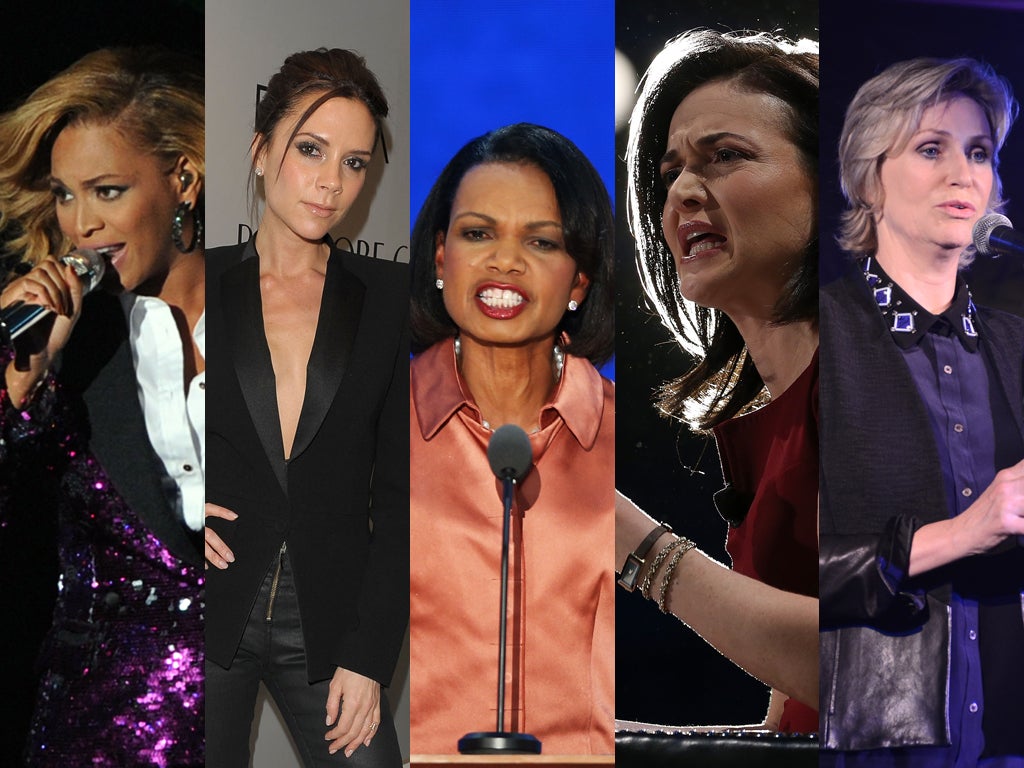Banning ‘bossy’: what's so threatening?
Sandberg and her supporters are just trying to make a point about gendered language

A new campaign to “ban the word bossy”, conceived by Facebook COO Sheryl Sandberg, has caught the imagination of international power women Beyonce, Victoria Beckham and Condoleezza Rice, who’ve signed up to front the crusade.
In the campaign video, Beyonce and Rice accurately observe that the “B-word” isn’t really used for men. Chaps are instead praised as “commanding”, “leader”, and other wonderful manly things. Lasses, however, are lampooned as overambitious as a pure matter of vocab usage. This, they say, is a deterrent to female ambition.
Of course, the drive has drawn withering responses from the reliably brutal world of online commentary. Forbes’s Micheline Maynard says “there are far worse things than being called bossy” (can’t beat the “think of all the worse things” argument). CNN has a comment piece by Peggy Drexler, who makes it personal, saying Sandberg deliberately plays a role as “downtrodden, one among many who've been victimized” (ouch). And, on the anonymous open comment front, we have the delicious hyperbole of the Independent news article’s thread, in which commenter ‘Rob Conway’ sneers (and this is one of several similar examples):
“Banning words. What a terrible way to attempt to address the issue of female leadership. Feels very Kim Jong Un… Ludicrous.”
I must have missed the news story where Jong-un attempted to raise awareness of the gender bias of the common lexicon.
This shouldn’t need to be said, but it seems obvious that Rice, Sandberg et al don’t actually plan to address the entire issue of female leadership by politically agitating to literally outlaw an adjective. The campaign banner could perhaps have been better chosen, but there is no scheme to behead citizens, a la Saddam, for uttering the B-word. In fact the campaign simply invites you to sign a pledge online to “ban” it by sharing stats and quotes. Oh god, please – not an online pledge! Dictatorship at its worst, surely.
Sandberg and her supporters are surely just trying to make a point. And points are hard to make in the world of gender equality because, much like in a dysfunctional marriage where all there is left to do is take turns to scream at each other without listening, the compassion has gone and bitter cynicism abounds. Each little piece of good, each interesting suggestion, each talking point in the gender equality debate, runs the risk of being derided and diminished by relentless criticism.
And, in a wider sense, that’s how it is for some girls and women. Feisty. Fiery. Difficult. Strident. Sassy. Shrill. Diva. High maintenance. Headstrong. Contrary. These are all words that are to some degree gendered, and all have negative connotations. Many times, I’ve heard the infantilising term “girl” being used to refer to 25-year-old women in a professional context. Even “feisty”, which might not seem on the face of it a bad thing to be, implies that the woman it describes is too big for her boots. Her pep is amusing; she thrashes noisily, but without efficacy.
These words are put-downs; and it is the scale of the use of them that is harmful to girls’ confidence; Sandberg quotes stats that say girls’ self-esteem drops far more than boys’ between lower and middle school. We fight against bullying and try to encourage young people to be verbally kind to each other in a general sense; so why are we horrified to be asked to think about the way we use gendered language? Maybe it’s the word “ban” (bound to ruffle feathers in a country that so prizes free speech). But what was Sandberg supposed to put in the video? “Please think about your use of the word ‘ bossy’ and consider replacing it with more positive adjectives”? Not so snappy. They’d be called out as wittering harpies – or, worse, ignored.
This is not a “look-what-the-men-did-to-us” article. It’s hard to quantify, but I guess that women use these words as much as men do. Our vocabulary is learned from those around us, and we often use it without much conscious thought. If our most easily available label for a commanding woman is “bossy”, most will lazily reach for that term first and, as they utter it, reinforce all the nasty junk that comes with it. As psychologists know, deliberately reconsidering the language we use can make a difference to how we see the world; this tweaking exercise is part of cognitive behavioural therapy.
To Micheline Maynard – you say young girls need to grow thicker skins, and posit that Sandberg’s childhood experience of being branded “bossy” may actually have been the driving force for her greatest achievements. It’s absurd to observe that there are barriers to success, and then argue that those very barriers were the reason that the few who succeeded managed to do so.
Join our commenting forum
Join thought-provoking conversations, follow other Independent readers and see their replies
Comments
Bookmark popover
Removed from bookmarks